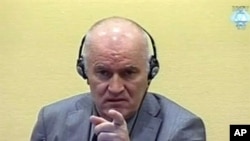The former Bosnian Serb military leader, General Ratko Mladic, is the latest to appear before the United Nations war crimes tribunal in The Hague.
The International Criminal Tribunal for the Former Yugoslavia, or ICTY, was established by the United Nations Security Council in May 1993 to prosecute those accused of atrocities stemming from the 1992 to 1995 Bosnian conflict. An estimated 100,000 people were killed and 2 million were displaced in the fighting.
This was the first time that a war crimes tribunal was set up since leaders of Nazi Germany were prosecuted at the Nuremberg trials between 1945-1949 and Japanese officials at the Tokyo trials between 1946 - 1948.
Court's Purpose is Deterrance
Experts say unlike the Nuremberg and Tokyo trials, the ICTY was set up during wartime. David Kaye, international law expert at the University of California, Los Angeles, or UCLA, says the U.N. had a particular reason to set up an international court during the conflict - deterrence.
“That if there was a mechanism out there to hold individuals accountable, it might cause people on the ground, that is military officers or political leaders, those responsible for these kinds of crimes, might cause them to think twice - because if they committed the act, maybe they’d be indicted and sent to The Hague for a trial,” Kaye said.
Marko Hoare, a Balkans expert at London’s Kingston University, offers another reason. “It was set up at a time when the West and the international community seemed to be doing very badly - they failed to bring peace. The war was flaring up and getting worse under their own eyes. So it was seen as a sort of alternative to action - so if you didn’t actually take any military action to halt the atrocities, at least you were setting up a tribunal to punish the perpetrators. So it was an alternative to action,” Hoare said.
Each case at the Yugoslav tribunal is heard by a panel of three judges, and the verdict is reached by a majority vote. The verdict can be appealed and that would be heard by a different panel of five judges. And because this is a U.N. tribunal, there is no death penalty - the maximum sentence is life imprisonment.
The most high profile case to date was that of former Yugoslav president Slobodan Milosevic, accused of genocide, crimes against humanity and violations of the laws and customs of war.
Marko Hoare says Milosevic used the forum as a propaganda tool.
“He didn’t really try and defend himself from the charges. He didn’t adopt a legal strategy; he seemed to use it as a platform from which to make political speeches. So in a sense, he strung the proceedings out as long as he could - he basically made a circus of the court. And this helped postpone the trial to the point where he actually died during the course of it - it was an unresolved trial as a result of that,” Hoare said.
Experts say Milosevic’s death in March 2006, months before a verdict was due, was a blow to the court.
But David Kaye says over the years, the tribunal has gained credibility.
“It has held dozens of trials. It has held trials of Bosnian Serbs, Bosnian Croats, Bosnian Muslims, Kosovar Albanians, Serbs in Serbia, Macedonians. It has really approached the entire history, in a way, of the wars in the Balkans in the 1990s. So it certainly has earned its credibility, and I think they have by and large been fair trials,” Kaye said.
Since its inception, the court has indicted 161 people and completed proceedings against 126. Sixty-four have been convicted and 13 acquitted.
Mladic Latest HIgh Profile Defendant
The latest high-profile defendant to appear before the international tribunal is former Bosnian Serb military leader General Ratko Mladic. He was arrested last month and appeared before judges for the first time on June 3. He joins Bosnian Serb political leader Radovan Karadzic, who has been on trial since October 2009.
That leaves only one man as the last remaining fugitive from the international court. He is Goran Hadzic, former president of the so-called “Republic of Serbian Krajina” in Croatia. He is charged with a number of crimes including murder, persecution, extermination and torture.










